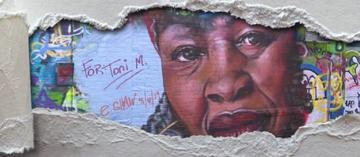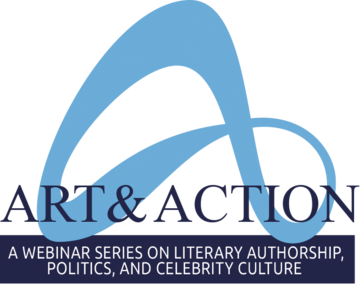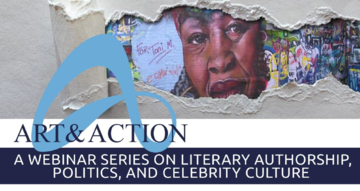Art and Action

A Webinar Series on Literary Authorship, Politics, and Celebrity Culture
In a lengthy opinion piece in the Financial Times, Booker-Prize-winning Indian author-activist Arundhati Roy, whose one-thousand-page volume of political non-fiction, My Seditious Heart, was published last year, offered a shrewd assessment of how Covid-19 has exposed and widened the inequalities that cut across capitalist societies. Nonetheless, Roy ends on a hopeful note. Proposing that the crisis “offers us a chance to rethink the doomsday machine we have built for ourselves,” she prophetically envisions the pandemic as a “portal” for us to “walk through lightly, with little luggage, ready to imagine another world” (3 April 2020). While celebrities from other entertainment industries and sports have drawn criticism for their public interventions during the corona crisis in what amounts to a systemic critique of celebrity culture itself, writers’ authority as moral compasses and voices of reason has emerged fully intact. This points towards a long tradition of authors using their public profiles and cultural capital to draw attention to a wide range of socio-political concerns and to act as acute critics of the zeitgeist, appealing to the political, moral, and social conscience of their readership.
Growing out of a two-day conference cancelled due to Covid-19, this series of webinars explores the intersections of authorship, politics, activism, and literary celebrity across historical periods, literatures, and media. Interrogating the ideological dimension of literary celebrity and highlighting the fault-lines between public and private authorial selves, ‘pure’ art, political commitment, and marketplace imperatives, this series joins current debates on authorship and literary value. It brings together writers, academics, literary activists, and industry stakeholders to explore the wider implications of authors’ political responsibilities and cultural authority in today’s heavily commodified literary marketplace and age of celebrity activism.
Please note the below programme of events took place in 2020.

Please find the PDF version of the abstracts here:
This series of webinars is convened by Sandra Mayer (University of Vienna / Oxford Centre for Life-Writing, sandra.mayer@wolfson.ox.ac.uk) and Ruth Scobie (Mansfield College, Oxford, ruth.scobie@ell.ox.ac.uk), and is supported by the Austrian Science Fund (FWF) and The Oxford Research Centre in the Humanities (TORCH) in collaboration with The Oxford Centre for Life-Writing (OCLW), Postcolonial Writers Make Worlds, and The Stephen Spender Trust.

Art and Action

- Asha Rogers, Lecturer in Contemporary Postcolonial Literature at the University of Birmingham
- Lyndsey Stonebridge is Professor of Humanities and Human Rights at the University of Birmingham
- Shantel Edwards, Creative Producer of the 2020 Birmingham Literature Festival
- Michelle Kelly, Departmental Lecturer in World Literatures in English in the English Faculty at the University of Oxford
- Simon Morgan, Head of History at Leeds Beckett University
- Divya A, Assistant Professor in English Literature in the Indian Institute of Technology Madras, India
- Odile Heynders, Professor of Comparative Literature and Head of the Department of Culture Studies at Tilburg University
- Ellen Wiles, Lecturer in Creative Writing at Exeter University
- Benedict Schofield, Reader in German and Director of the Centre for Modern Literature and Culture at King’s College London
- Anna Paluchowska-Messing, Research Fellow and Lecturer in British Literature and Culture and faculty member in the Institute of English Studies of the Jagiellonian University in Kraków
- Eva Sage Gordon holds an MFA in Fiction Writing, an MA in English, and is currently a Ph.D. student in English at The Graduate Center, CUNY in New York City
- Kieran Hazzard, Historian of Britain and India during the 18th and 19th centuries, specialising in British politics and the East India Company
- Elisa Bizzotto, Associate Professor of English Literature at Iuav University of Venice.
- Hyei Jin Kim, currently a DPhil candidate at the University of Oxford
- Alice Guthrie, Independent Translator, Editor, and Curator specialising in contemporary Arabic writing.
- Daniel Medin, Editor and Professor at the American University of Paris (AUP), where he teaches contemporary world literature and editorial practice
- Charlotte Ryland, Director of the Stephen Spender Trust and founding Director of the Queen's College Translation Exchange, an initiative based at the University of Oxford
- Alan Taylor, Editor and board member of the Scottish Review of Books since 2004
- Elleke Boehmer, Professor of World Literature in English at the University of Oxford and a Fellow of the Royal Society of Literature
- Peter D. McDonald, Professor of English and Related Literature at the University of Oxford
- Margie Orford, Author of the internationally acclaimed Clare Hart novels
- Rachel Potter is Professor of Modern Literature at the University of East Anglia
- Carles Torner, leading Catalan Writer and human rights activist, currently Executive Director of PEN International
- Laetitia Zecchini, Research Fellow at the CNRS in Paris and visiting scholar at Boston University
- Tore Rem, Director of UiO:Nordic, an interdisciplinary research initiative, University of Oslo, and Professor of English-language literature
- Foteini Dimirouli, Outreach Fellow and Career Development Fellow in English, Keble College, Oxford
- Margaret Scarborough PhD Candidate in Italian and Comparative Literature, Columbia University, New York
- Elleke Boehmer, Professor of World Literature in English at the University of Oxford and a Fellow of the Royal Society of Literature.
- Benjamin Zephaniah is one of Britain’s most eminent contemporary poets, best known for his compelling spoken-word and recorded performances. An award-winning playwright, novelist, children’s author, and musician, he is also a committed political activist and outspoken campaigner for human and animal rights.
- Malachi McIntosh is editor and publishing director of Wasafiri. He previously co-led the Runnymede Trust’s award-winning Our Migration Story project and spent four years as a lecturer in postcolonial literature at the University of Cambridge.
- Q&A Chaired by Professor Wes Williams, TORCH Director.


